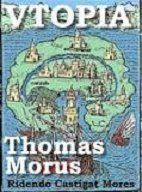
Arquivo para August, 2015
Utopian, republic and networks
The name “utopia” is due to one of them, perhaps most of all, the Thomas More (1516), which opened the second book of Utopia, with the recommendation of the disciple Matthew: “And what I say quietly and the ear, proclaim it loudly and openly. ”
(1516), which opened the second book of Utopia, with the recommendation of the disciple Matthew: “And what I say quietly and the ear, proclaim it loudly and openly. ”
The books “imaginary” as Utopia is Morus, the Sun City (1623) of Tommasio Campanella, the New Atlantis (1627) by Francis Bacon, the Panorthosia (1657) Comenius and the Supplement to the New Atlantis Glanvill ( 1675), put desires of various types in easy language to all readers.
In the writings of Bacon and Campanella there is an emphasis on education, encyclopedic and playful; the appreciation of the natural sciences and the arts although with an instrumental sense of a mystical order; the use of a language is only by combining the Christian symbolism and hermetic, would be closer to the Sun City Panorthosia more than the two accounts of the New Atlantis.
A specific point in all but the Morus, is the progress that characterizes modernity is closely associated with the advancement of scientific and technical knowledge, as Morus wanted this in the moral, political and religious grounds, but did not rule that knowledge was perceived but especially in the arts.
The inspiration of New Atlantic served for the construction of the first scientific academies, including the first scientific academies, expressed in the Royal Society, and is also the starting point of Glanvill full, one of his essays on important issues in philosophy and religion, he takes up some traces of Bensalem discovery, as his home of Solomon, already referred to as the Royal Society in other works.
Panorthosia however, has no locus like other utopias, it’s a drawing of a reformed world, does not call into particular scene characters whose experiences testify attractive differences, but it was so continuist.
Discovered only in 1935, Panorthosia is a description of an ideal republic, by which we become aware of its laws, institutions and customs.
Utopia is part of the incomplete work universal deliberation on the reform of human affairs (De Rerum humanarum emendatione Consultatio catholica) that would be made up of seven parts: Panegersia (Universal Awakening); Panaugia (Lighting Universal); Pansophia (Universal Wisdom); Pampaedia (Universal Education); Panglottia (universal language); Pannuthesia (Exhortation Universal), and Panorthosia (Universal Reform) any resemblance to today’s body is not a coincidence.
Morus was more Renaissance, wanted a human advancement rather than technical, culture is needed for this, more than the structures of the modern state, lacking a moral utopia of mass, or maybe not miss more, the networks are there

